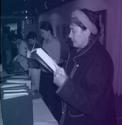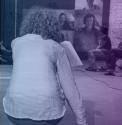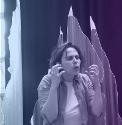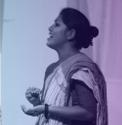My Dance
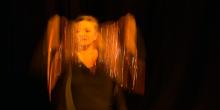
Nora Amin liberates the so-called belly dance from the sediments of history: she inverts the voyeuristic and exoticized perspective into a perspective of one's own body and history, allowing the audience a new view. My Dance is an attempt to shift power, a reflection on female sexuality, the erotic self, and patriarchal oppression, as well as the impact of colonialism and racism on belly dance and on the image of women that goes with it.
The solo is also a personal testimony of the author, choreographer and director, who traces her own body history between Egypt and Germany. She searches for an artistic language that embodies both trauma and the ecstasy of liberation, and allows for communal dancing as an intimate and decolonial practice beyond the categorizations of white economies.
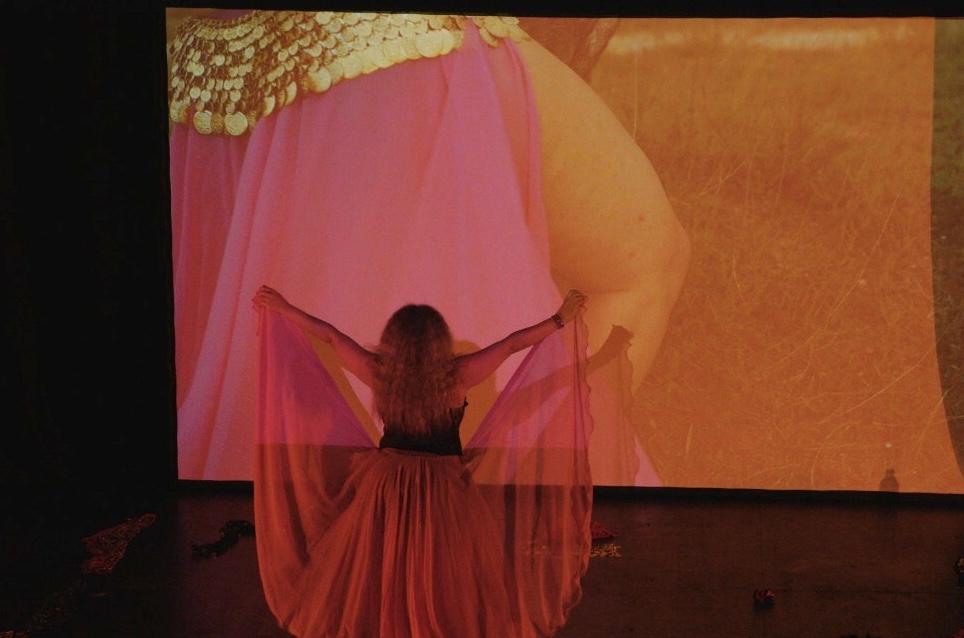 CONCEPT, TEXT, CHOREOGRAPHY, PERFORMANCE Nora Amin
CONCEPT, TEXT, CHOREOGRAPHY, PERFORMANCE Nora Amin
MUSIC, SOUND TRACK COMPOSED BY Nora Amin, Ehab Abdellatif
VOCALS Nora Amin
VIDEOGRAPHY Ehab Abdellatif
SPECIAL THANKS TO Rusnam and "ctrl.xxx.tension" for the music of the last dance, and to Ayman Asfour for the violin piece Outlander.
Produced as part of White Money, a Flinn Works production. Supported by Fonds Darstellende Künste with funds from the Federal Government Commissioner for Culture and the Media and Berliner Senatsverwaltung für Kultur und Europa.
Premiered on 18 November 2021, at Sophiensæle (Berlin), as part of White Money.
NORA AMIN is an author, theatre director, researcher, performer, and choreographer based in Berlin. Her work is situated between literature, theatre/dance and feminism and is borne by socio-political activism that rebels against traditions of patriarchy, authority, coloniality, sexism and racism. She has written several novels and essays. In 2000 she founded the theatre group LaMusica in Cairo, and in 2011 the nation-wide Egyptian
Project for Theater of the Oppressed, followed by an Arab network in Lebanon, Morocco and Sudan. Before moving to Berlin in 2015, she had directed and produced 40 theatre, dance and music productions. She was a fellow at the International Research Center for Interweaving Performance Cultures at FU Berlin, where she also held the S. Fischer Visiting Professorship in Literature (2004/05) and the Valeska Gert Visiting Professorship for dance sciences (2018). In 2018, her essay Weiblichkeit im Aufbruch on the transgressions of female corporeality in public space was published by MSB Matthes & Seitz. In 2021, Dance of the Persecuted was published on the history of Egyptian Baladi dance from a feminist perspective. In the same year, she was the curator of the symposium of the German Centre of the International Theatre Institute, on Equality &
Hybridity, looking at the e ects of colonialism, eurocentrism and racism on transnational cooperation in the performing arts, as well as main curator of Creating Access Diversity, symposium by Dachverband Tanz Deutschland in connection to the Tanzpreis 2021. She has conducted of Baladi Dance from a feminist perspective at Berlin Mondiale, Tanzfabrik and Sasha Waltz & Guests, among others.
Technical requirements
White screen for video projection, size 6X4
Video projector, taking input from a laptop, with cables
12 light units: 2 on stands with shutters, 4 on the oor with shutters, and 6 suspended from pipes (including 2 profiles)
Speakers and sound mixer, 4 speakers surrounding sound, and sound monitor on stage
Headset wireless mic
condenser mic on a stand for tabla live music on stage
Size of the performance area: minimum: 5m depth X 6m width
No set
No dance floor required
Time for technical preparation and set up: 4 hours
General rehearsal: 90 minutes (with stops for corrections).
Duration of performance: 70 minutes.
Language: English (with scattered Arabic words, and one song in Arabic)
Suitable for all audiences above 14 years old.
The performance includes hard topics, such as trauma, rape, injuries and disability. The video projection include nudity.

